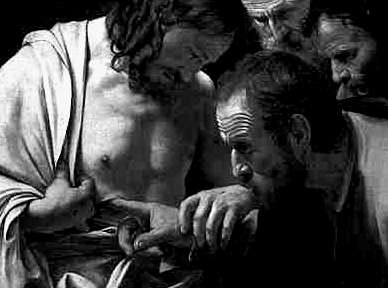 Fr. Cantalamessa reminds us that "Christ's death is the supreme witness of his charity, but not of his truth. This truth is adequately testified to only by the Resurrection." When the Psalmist says that "the stone the builders rejected has become the cornerstone," it is Christ that the Holy Spirit is speaking of; but the cornerstone is the Risen Christ. The fully divine and fully human cornerstone of that living temple which is the Church is eo ipso the cornerstone of our faith. "The faith of Christians," says St. Augustine, "is the resurrection of Christ. It is no great thing to believe that Jesus died; even the pagans believe this, everyone believes it. The truly great thing is to believe that he is risen." Of course, Augustine lived before Islam, which denies that Jesus truly died; but then, the human religious imagination can always find a premise with which to quibble. The fact remains that the death of Christ is as historically well attested as any death in the ancient world. He bears its marks even now: the same marks that doubting Thomas touched. The risen and wounded Christ is the supreme revelation of Truth.
Fr. Cantalamessa reminds us that "Christ's death is the supreme witness of his charity, but not of his truth. This truth is adequately testified to only by the Resurrection." When the Psalmist says that "the stone the builders rejected has become the cornerstone," it is Christ that the Holy Spirit is speaking of; but the cornerstone is the Risen Christ. The fully divine and fully human cornerstone of that living temple which is the Church is eo ipso the cornerstone of our faith. "The faith of Christians," says St. Augustine, "is the resurrection of Christ. It is no great thing to believe that Jesus died; even the pagans believe this, everyone believes it. The truly great thing is to believe that he is risen." Of course, Augustine lived before Islam, which denies that Jesus truly died; but then, the human religious imagination can always find a premise with which to quibble. The fact remains that the death of Christ is as historically well attested as any death in the ancient world. He bears its marks even now: the same marks that doubting Thomas touched. The risen and wounded Christ is the supreme revelation of Truth.Thus, what God himself now looks like is God's answer to the so-called "problem of evil." As the Pope said today:
We may all be tempted by the disbelief of Thomas. Suffering, evil, injustice, death, especially when it strikes the innocent such as children who are victims of war and terrorism, of sickness and hunger, does not all of this put our faith to the test? Paradoxically the disbelief of Thomas is most valuable to us in these cases because it helps to purify all false concepts of God and leads us to discover his true face: the face of a God who, in Christ, has taken upon himself the wounds of injured humanity.
When we notice how the innocent suffer even as the guilty prosper, we tend to discount the wounds of Christ. We assume, with some reason, that God could wipe away all injustice, all disproportionate suffering, merely by willing it so. With as much reason, we assume that God is not as discomfited by such evils as we are. Many Christians think, and a few have even said: "He's God, after all; he can take it; what is it to us if he took it?" But that misses the point. If Christianity is true, he chooses to undergo all such evils himself rather than eliminate them, and precisely in so doing, empowers us to transcend ourselves amid and through the evils we cannot escape. That is shown in the true face of God which we see in the crucified and risen Christ.
Skeptics and cynics suspect that a God who would set things up that way is too perverse to be worth worshipping, if indeed he exists at all. Why would the allegedly Omnipotent suffer, and bear the marks thereof even in triumph, rather than just set things right in a stroke? Why, for that matter, did he not create us so that we could not sin, having only "good" alternatives available for choice? No answer we have, or could have, can prove that things had to be as they are rather than otherwise. Nature does give us hints, to be sure. E.g., we survive by eating, which means killing and absorbing other living things that become part of our substance. Does not life grind us up too? And might not the point be that we are meant to become part of something greater, something personal, that we do not understand? But reason does not suffice to assure; the only clear answer we have been given is by divine revelation: God considers the whole thing worth it, abiding with us in the darkest corners of our existence even as he abides in paradise, so that we may join him there if we conform ourselves to the pattern he has shown us.
This side of paradise, that's something we must hold by faith rather than sight. But the gift of faith makes it as certain for the recipient as any fact can be. That is why the bodily resurrection must be insisted upon. St. Athanasius famously said: "Whatever is not assumed is not redeemed." The contrapositive of that is that whatever is assumed is redeemed. All has been redeemed, because all has been assumed, and thus transmuted. Unlike Thomas and the other Apostles, we cannot usually see that; in this life, the vision of the Uncreated Light is for the few. But it is our sure hope as we wait and toil in the shadows. This Easter season, let us keep our gaze fixed on the Risen One. We will find him in surprising places.

























